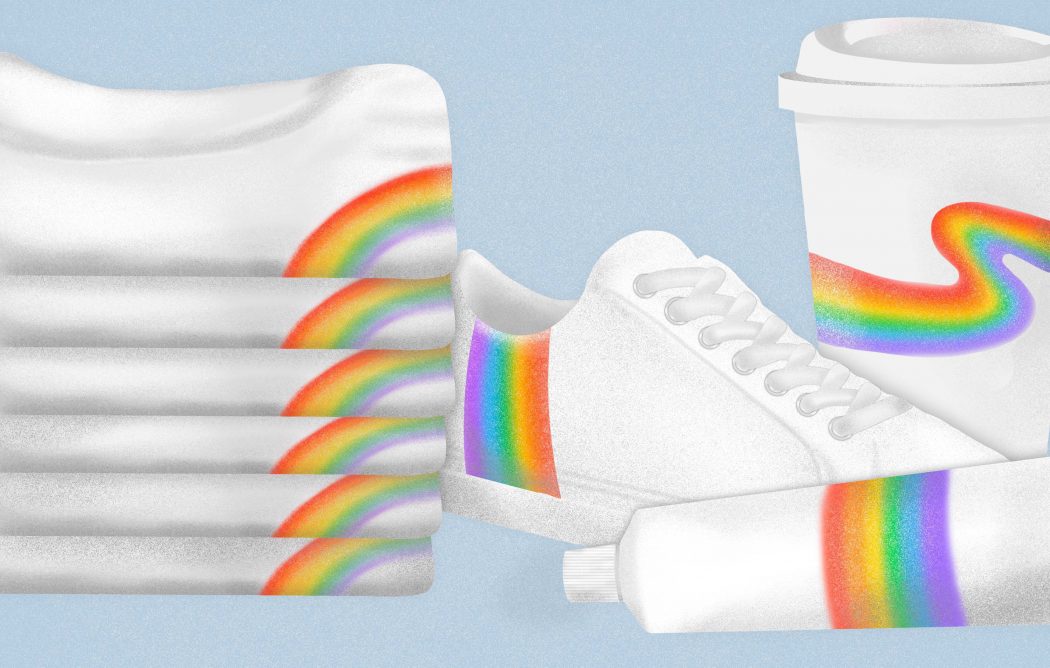This article was published as part of the Bull & Bear’s Pride 2021 series.
Pride Month is one of my favorite times of the year. Although I would prefer if people celebrated the lesbian, gay, bisexual, and transgender community with the same enthusiasm year-round, I adore seeing openly out, closeted, and questioning people celebrate who we are and the rich history of some of the strongest people to have ever lived.
As a young lesbian, I love to witness all the symbols that define this month of open appreciation for LGBT people and progress. There are rainbow crosswalks, a plethora of people sharing their story and their beautiful faces on social media, and even rainbow Ugg Boots. Then, of course, there are the Pride parades, which are, without a doubt, the best parties to exist on the face of the planet. I feel comforted by the allies that elevate and support our identities and freedom to love who we love and express ourselves as who we are.
But in the midst of our celebration, it is easy for our heterosexual peers, even our allies, to be blinded by the shallow display of rainbows and LGBT symbols that undermine the historical background that allows us to show off our pride in the first place. Corporations take this month as an excuse to profit off of essential LGBT icons, consequently minimizing what makes Pride the riotous event it originally was. Block parties and Google Doodles make Pride more digestible for straight people to swallow without putting in the effort to understand the radical politics of the movement’s origins.
Pride began as a protest—have you ever hear of the Stonewall Riots? As a piece of history known only as “the beginning of Pride” by most people and corporations, the people of colour and LGBTQ+ activists who risked everything to protect the community from persecution and hate are ignored in favour of the ‘trends.’ On the morning of June 28, 1969, the LGBT-owned Stonewall Inn was bombarded with a police raid. In response to this unfounded attack, the LGBTQ+ community present at the time enacted a riot that continued until July 3. Multiple activist groups, such as GLAAD (The Gay and Lesbian Alliance Against Defamation) were born in the wake of Stonewall.
Corporations take this month as an excuse to profit off of essential LGBT icons, consequently minimizing what makes Pride the riotous event it originally was.
We owe the freedoms and rights we’ve worked so tirelessly to own and preserve to our predecessors, especially Black and Hispanic transgender people, many of which are credited for founding spaces for the community to continue the battle against homophobia. But when perusing the Target Pride section that never fails to pop up on June 1st, you won’t find any merchandise dedicated to this history. You’ll certainly come across plenty of rainbows, perhaps other LGBT flags, and shirts that vaguely hint towards Pride, but you’re unlikely to encounter slogans that discuss HIV/AIDS prevention or campaigns to end conversion therapy.
Why do corporations like Target avoid realistic depictions of Pride and prefer simple catchphrases like “Love is Love,” you may wonder? The answer has been obvious to us LGBT+ folks for quite some time; these companies don’t actually care about us. This supposed support of the community is just a front for making a profit. Think of Valentine’s Day, Christmas, Hanukkah, and nearly all other major holidays; they’ve become corporate money-making machines, and now Pride and Black History month are being moved through the same processes of mechanization.
It’s frankly disgusting in some ways. LGBT + history left very little room for celebration and was realistically plagued by hatred, death, and oppression from nearly all powerful organizations. Corporate rebranding of Pride to cater more towards straight people and the more “accepted” members of the community (white gay men, especially) distorts the true meanings of this month and excludes communities that receive comparatively little appreciation from society. People who are racialized and also hold LGBT+ identities are especially impacted by this ignorance; as Black trans women are being murdered at an alarming rate, capitalism blinds its audiences from these tragedies during the prime time to educate and act against these injustices.
They’ve become corporate money-making machines, and now Pride and Black History month are being moved through the same processes of mechanization.
Pride is not a gateway to corporate prosperity. It’s a single word, one month that embraces and honors the past, present, and future of the LGBT+ community. Decades of loved ones lost, protests organized, rights confiscated, and later repossessed, stand behind the entirety of this community. Capitalism has no place in the celebration as something that has objectified our identities and exploited our expression. Pride is not a fad to be revised to better appeal to heteronormative values.
If you’re looking for a Pride outfit to wear or art to share, consider browsing/promoting small, LGBT-owned Canadian businesses, such as Fluide, BlackQueerMagic, and Priape here in Montreal. You can also consider attending Pervers/cité, a non-commercial Pride celebration alternative. We are meant to uplift one another, both this month and in the subsequent eleven. So, hold out a hand to your community and help us give corporations a rainbow-colored middle finger.




